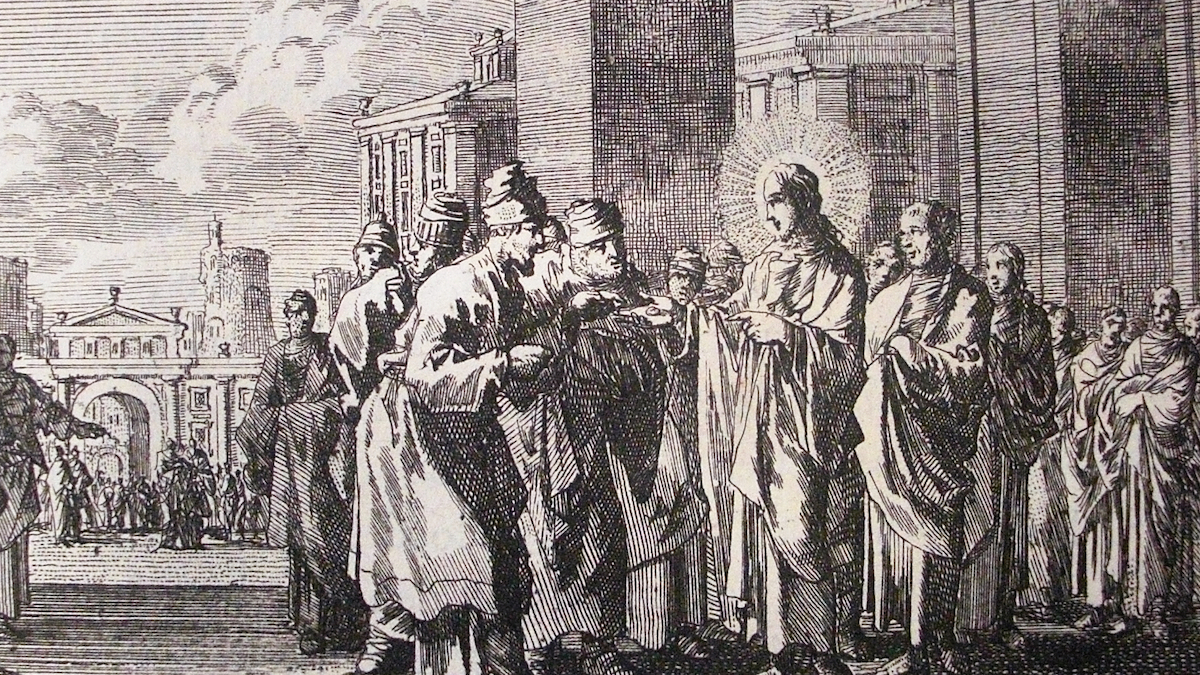In the Gospel of Matthew (22:15-21), Jesus teaches us that he expects us, his disciples, to be consistent, viscerally grateful and of solid integrity. After seeing the embarrassment of the Pharisees as Jesus repeatedly exposed to public scrutiny their inconsistency, ungratefulness, and dishonesty, we should decide to conduct ourselves in the spirit of truth.
How embarrassed had the Pharisees been? All four gospels record the many times their hypocrisy was unmasked by Jesus. In this gospel passage (Matthew 22:15-21), we realize that they had been so deeply and so repeatedly embarrassed that they overcame their hate and disdain for the Herodians, who were pro-Romans so that, the two groups together, could force Jesus to compromise himself publicly.
Here is the historical background which gave the Pharisees reasons to believe that they had devised the perfect trap for Jesus. Moneychangers were necessary so that devout Jews could exchange Roman coins for Jewish currency within the Temple precincts for donations and for buying the animals to be sacrificed to God. The Roman coins were considered idolatrous by the Jews, especially by the overtly devout Pharisees, because they had the following inscription: Tiberius Caesar Divi Augusti Filius Augustus Pontifex Maximus. Tiberius Caesar, son of the divine Augustus, supreme pontiff.
The Roman coins were idolatrous because they had the graven image of the emperor Tiberius, who considered himself a god and a son of a god (Augustus) and the supreme pontiff or high priest of a false religion. Besides griping for this unintentional insult to the Hebrew religiosity, the Jews had another problem with the Roman currency: each Jew had to pay a denarius, the equivalent of a daily wage, as a yearly tax to the Roman government. This tax assured many benefits in addition to security: public services, law and order, and all the rights associated with being a subject of the Roman Empire in good standing.
The Pharisees were counting on Jesus as a truthful man and one who did not regard a person’s status to speak his mind freely. Jesus would be doomed before the pious Jews if he considered the Roman coin not idolatrous and doomed before the Herodians and the Romans if he objected to paying the census tax. As the tables were turned by him who is the Truth itself, their true mettle was exposed and their hypocrisy along with it.
They claimed to be faithfully serving the only true God while abhorring any type of idolatry, yet they carried on their belts and used the Roman coins for their daily business. Thus, suddenly, by pulling out a denarius, the truth was in plain view, and it burned them all. Their hypocrisy unmasked revealed that they did not care about God or about a sound Roman government: they care only about themselves.
At this time, confronted by Jesus, who is the Truth, are we confident that he finds us consistent with our call to be his disciples, filled with constant, sincere gratitude for the blessings he gives us directly and through “Caesar” (local, state, and federal government), and do we remain driven by solid integrity untouched by compromises? The Pharisees thought that they could entrap Jesus so that, with him out of the way, they could continue to be driven by greed (cf. Luke 16:14), be concerned about appearance over substance, and be lukewarm in their worship.
My humble advice for all of us, people in constant need of reliance on God’s mercy, is that we should seek to be lovingly “entrapped” by Jesus and by his Truth which is always able to pierce through and expose any pretension, hypocrisy and make- believe. We should not worry about what people think about ourselves but, rather, make our choices guided by solid integrity and not in a way paved by compromises and convenient reversals. We should not lead a life influenced by popular polls, or by fads and trends and/or by what worldly experts propose, but by whatever is consistent with the Gospel—exclusively.
On this 29th Sunday in Ordinary Time, we also celebrate World Mission Sunday. Hence, our prayers and thoughts should go to our indigent and suffering brothers and sisters in distant mission lands. If we are able, we should also make a generous donation to help them financially. The yearly World Mission Sunday is celebrated so that we may never forget that it is our duty as disciples of Jesus Christ to be missionary ourselves, around the clock, 24/7, 365 days a year.
The best homily we can preach is the homily of preaching humbly and sincerely with our life. With the help of the Holy Spirit, we can start with an eloquent, clear yet unassuming example of striving to be believers consistent with the teaching of the Gospel, filled with heartfelt gratitude to our most loving and most merciful God and guided by integrity in our dealing with each other.








